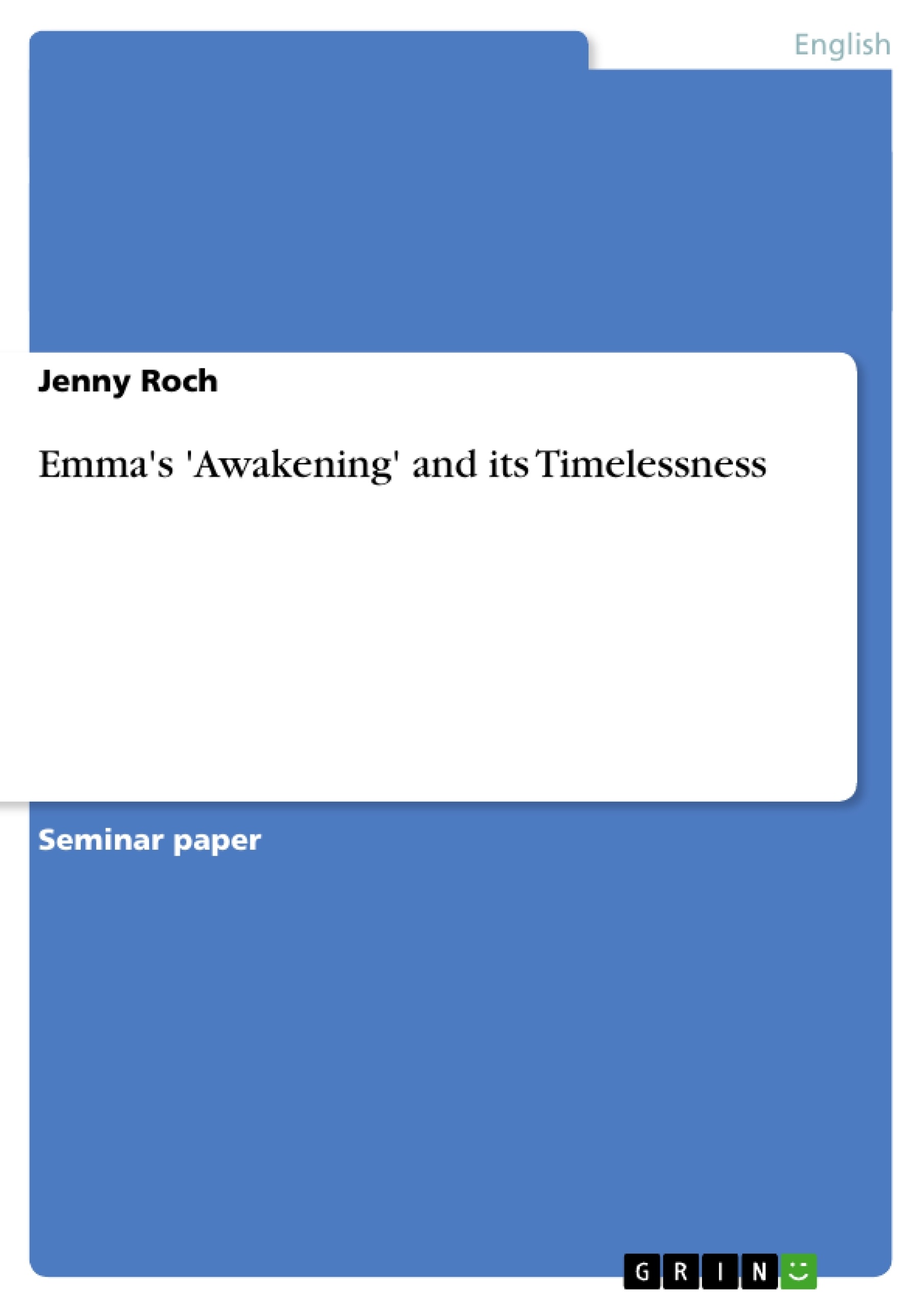This essay will focus on why and how the heroine of the eponymous novelEmmaundergoes a development in her character and how she comes to be, at the end of the novel, more mature than at the beginning.
Emma’s situation in life is disclosed on the very first page of the novel. Miss Woodhouse is ‘handsome, clever, and rich, with a comfortable home and a happy disposition’6. Throughout the chapter, the reader learns that her father is a ‘nervous man, easily depressed, […] of gentle selfishness’7. Their situation of just having lost ‘poor Miss Taylor’ is described as an enormous loss, to both father and daughter. The narrator, for his part, enables the reader from the very start to eye Emma critically, as he deems the ‘real evils of [her] situation … the power of having too much her own way, and a disposition to think a little too well of herself’. However, ‘the danger [of this is] … unperceived’10by Emma, and the narrator makes it clear from the very first page that the reader can expect at least some of the action of the novel to stem from this weakness, and that it is on this blindness that the further development of Emma’s character will always depend.
Instead of getting herself involved in a romantic relationship, she makes them for others. In the very first chapter, after the wedding of Miss Taylor and Mr Weston, she proudly proclaims that she ‘made the match [her]self’, but after some rebuke from Mr Knightley, who suspects it to be a fantasy in her head that happens to have come true, Emma has to yield to the fact that it was indeed a ‘lucky guess’. But Miss Taylor is indeed now Mrs Weston, and Emma sees this as a success good enough to encourage her to continue with her ‘talent’. Her next object, or should one say victim, unlucky enough to taste the ambition of Emma’s heart, is Harriet Smith, an orphaned young lady, who lives in Mrs Goddard’s boarding school.
Inhaltsverzeichnis (Table of Contents)
- EMMA'S 'AWAKENING' AND ITS TIMELESSNESS
- Emma's Development in the Novel
- Emma's 'Talent' and the Misjudgements of Matchmaking
- From Blindness to Insight: The Transformation of Emma's Character
Zielsetzung und Themenschwerpunkte (Objectives and Key Themes)
This essay explores the character development of Emma Woodhouse in Jane Austen's novel, "Emma." It analyzes how Emma's initial naiveté and self-importance lead her to make a series of misjudgments, ultimately leading to a transformation in her character.
- Emma's vanity and self-importance
- The impact of Emma's matchmaking attempts on others
- Emma's gradual recognition of her own flaws
- The role of Mr. Knightley in Emma's development
- The timeless appeal of Emma's character arc
Zusammenfassung der Kapitel (Chapter Summaries)
The opening chapter introduces Emma as a wealthy and self-assured young woman with a tendency to think highly of herself. Her father is described as a "nervous man," and Emma's power to have "too much her own way" is highlighted as a potential source of trouble.
Emma's matchmaking attempts, starting with her successful orchestration of Miss Taylor's marriage to Mr. Weston, are initially portrayed as a "talent" but quickly become a source of conflict. Her manipulation of Harriet Smith, a young woman she attempts to mold into a suitable match for Mr. Elton, the parish priest, is particularly ill-advised and demonstrates her arrogance and snobbery.
As the novel progresses, Emma's misjudgments continue to unfold, with her mistaking Mr. Elton's interest in her for romantic affection and subsequently falling prey to her own vanity and misinterpretations.
The arrival of Frank Churchill and Jane Fairfax further complicates Emma's life, leading her to indulge in prejudice and hypocrisy. Emma's jealousy of Jane Fairfax and her misinterpretation of Frank's intentions towards her result in a series of comedic and ironic moments, highlighting her continued blindness to the true nature of her own feelings and the realities of the situation.
Emma's eventual recognition of her flaws and the pain caused by her actions, particularly her insensitive treatment of Miss Bates, is crucial to her character development. She begins to understand the importance of considering others' perspectives and experiences.
Schlüsselwörter (Keywords)
Key terms and themes explored in this analysis include Emma's vanity, matchmaking, self-importance, misjudgments, character development, social status, romantic relationships, and the portrayal of English country gentry in Austen's novel.
Frequently Asked Questions
What is the central focus of this essay on Jane Austen's Emma?
The essay focuses on the character development of Emma Woodhouse, specifically how she transitions from a state of naiveté and self-importance to becoming more mature and insightful by the end of the novel.
How is Emma Woodhouse described at the beginning of the novel?
Emma is introduced as "handsome, clever, and rich," but the narrator also highlights her weaknesses: having too much her own way and thinking a little too well of herself.
What role does matchmaking play in Emma's character arc?
Emma views matchmaking as a "talent" she possesses. Her attempts to orchestrate relationships for others, such as Harriet Smith and Mr. Elton, serve as catalysts for her misjudgments and eventual self-recognition.
Who is the most influential figure in Emma's development?
Mr. Knightley plays a crucial role by offering rebukes and guidance, helping Emma recognize her flaws and the consequences of her actions.
What event marks a turning point in Emma's social awareness?
Her insensitive treatment of Miss Bates is a key moment that leads Emma to feel pain for her actions and realize the importance of considering others' perspectives.
- Citation du texte
- Jenny Roch (Auteur), 2005, Emma's 'Awakening' and its Timelessness, Munich, GRIN Verlag, https://www.grin.com/document/49140



